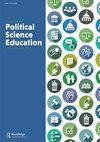概念映射与阅读理解
IF 0.6
Q3 POLITICAL SCIENCE
引用次数: 3
摘要
摘要本文介绍了在研究生和本科生阶段实施的概念图教学实践。首先,一小群研究生在准备参加资格考试时,努力构建一个概念图,说明已发表作品之间的联系。一项类似的作业——直观地描述课程阅读之间的联系——在一门大型在线本科生课程的期中考试和期末考试之间进行。在本科课程中,期中和期末论文的回答有了显著的改善,学生们在回答中比较和对比了阅读材料,学生们认为这是一项有价值的练习。对本科生和研究生的结构化访谈进一步证实,概念图可以提高两个教学水平的学习成果。该项目揭示了两组学生处理涉及阅读的关系练习的方式上的重要差异,并提出了使用概念图来提高学生对材料的记忆力的方法。本文章由计算机程序翻译,如有差异,请以英文原文为准。
Concept Mapping and Reading Comprehension
Abstract This paper describes a concept mapping teaching exercise that was implemented in different stages at both the graduate and undergraduate level. First, a small group of graduate students worked to construct a concept map that illustrated the connections between published work as they prepared to take their qualifying examinations. A similar assignment—visually depicting connections between course readings—was implemented between the midterm and final exam in a large-section online undergraduate course. In the undergraduate course, there was noticeable improvement between midterm and final essay responses in which students compared and contrasted readings, and students reported perceptions of it as a valuable exercise. Structured interviews with both undergraduate and graduate students further confirm that concept mapping can improve learning outcomes at both levels of instruction. The project reveals important differences in the way that both sets of students approach relational exercises involving readings and suggests ways of using concept mapping to enhance students’ retention of the material.
求助全文
通过发布文献求助,成功后即可免费获取论文全文。
去求助
来源期刊

Journal of Political Science Education
POLITICAL SCIENCE-
CiteScore
1.80
自引率
36.40%
发文量
69
期刊介绍:
The Journal of Political Science Education is an intellectually rigorous, path-breaking, agenda-setting journal that publishes the highest quality scholarship on teaching and pedagogical issues in political science. The journal aims to represent the full range of questions, issues and approaches regarding political science education, including teaching-related issues, methods and techniques, learning/teaching activities and devices, educational assessment in political science, graduate education, and curriculum development. In particular, the journal''s Editors welcome studies that reflect the scholarship of teaching and learning, or works that would be informative and/or of practical use to the readers of the Journal of Political Science Education , and address topics in an empirical way, making use of the techniques that political scientists use in their own substantive research.
 求助内容:
求助内容: 应助结果提醒方式:
应助结果提醒方式:


